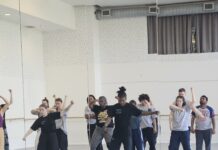
IRELAND ran in a grand total of 60 points against an unusually soft Japan side on Saturday, but with a premier opposition like the All Blacks in the calendar for next weekend, can Ireland bring a similar standard again?
For those unfamiliar with Japanese rugby or the role rugby players among the Japanese people today, the sport is flourishing in Japan, with entirely new cultures and styles of play emerging within the game and among those who play it.
The Japanese Top League is now home to some of the games biggest names and this is a trend which is likely to grow. The Japanese national team has become world rugby’s most lovable underdog since their triumph over the Springboks at the 2015 World Cup and the brave blossoms status among rugby nations is only getting higher.
Since defeating Ireland at the 2019 World Cup, Japan have played in some of the biggest games in the rugby calendar, such at the opening fixture of the 2021 Lions Tour at Twickenham.
There is a lot to unpack from Ireland’s win over Japan such as Ireland’s new style of play with their free flowing attack but there is one caveat to the fixture, Japan had a bad game.
Japan have played very little since the 2019 World Cup and to make matters worse, they suffered a number of injuries ahead of departing for Europe, namely back-row Naoki Ozawa, lock Yuya Odo and most significantly their captain and leader Michael Leitch.
Although there’s a wealth of unforeseen positives that can be taken from Ireland’s performance last Saturday. They shocked many skeptics by unveiling a brand new style of play which was fast, instinctive and extravagantly entertaining. So let’s dig in!

Ireland express themselves
Ireland head coach Andy Farrell has seemingly steered Ireland away from the style of rugby which his predecessor Joe Schmidt made so famous. Schmidt prioritised holding onto the ball and maintaining a narrow attack, only spreading to the wings to kick or exploit a blatant overlap.
Farrell threw all of that out last weekend and ushered in a style or rugby which was fast, physical and prioritised keeping the ball alive. Leinster have shown similar flair but converting such a skillset to the international stage is a tough task, yet many nations like New Zealand, France and Japan, seem to swear by it.
When it comes to rugby, imitation is the greatest form flattery and Farrell’s Ireland appeared to play a fresh brand of rugby heavily influenced by the Japanese’s space orientated attacking style, example seen below:
Now if this try was scored by a Schmidt coached Ireland side, it would have given him a heat attack, for number of reasons. Not only did Schmidt have a distaste for offloading, which Ireland did thrice above, but the neat grubber from Jameson Gibson-Park to Andrew Conway is an example of a Japanese style tactic never before embraced by Ireland.
Japan have been known to exploit whatever space they have, no matter how tight the gap may be, how small the patch of space is or how risky the execution, Japan would be skilled enough to pull it off. (Example below)
Ireland off-loaded a total of 17 times throughout the game on Saturday, yet in Schmidt’s final Six Nations tournament as head coach they off-loaded 13 times throughout five games, which is one of the many examples of Schmidt’s extreme ‘risk free’ approach which has now been scrapped by Farrell.
Although these two examples aren’t identical, they are similar and Ireland’s fast tempo facilitated by Gibson-Park gave them the foundation for this new free flowing style which is so different to previous Irish performances.
Although Farrell has moulded this Irish side into a completely different product than his predecessor, there are remains of Joe Schmidt’s time in the drivers seat.
Ireland remained relatively strict with possession throughout the 80 minutes, although this could have just been a luxury afforded by Japan’s poor defence, it could be a central principle as Farrell and his men look ahead to the All Blacks game.
Ireland enjoyed 63% of the possession and 68% of the territory, which is above average for an international test match. Within those numbers, Ireland carried a total of 100 times and threw a whopping 215 passes, resulting in the 60 point scoreline.
As Farrell looks to strike harmony between ‘keep the ball alive’ and ‘keep it in your hands’, the stats from the game seem to support both schools of thought.
Vulnerability and Indiscipline
Now with the greatest challenge of the Farrell era on the horizon, let’s break down the negatives.
In the days leading up to this Autumn Nations fixture, questions arose regarding the conditioning of Irelands key players. Those returning from Warren Gatland’s Lions squad seemed to be swarmed with question marks, resulting in the rugby media dubbing them as “under cooked” before the series began.
Players such as Jack Conan, Conor Murray and Tadhg Beirne returned to the test rugby in a smooth fashion, debunking the claims which swirled around the media.
However, there were signs of rust in the nooks and crannies of the Irish which could render them vulnerable when faced with a well oiled machine like the All Blacks.
Ireland conceded a sizeable 21 turnovers against Japan, although this didn’t affect their possession percentage due to them being able to regain possession from Japan with relative ease.
However if a similar number of turnovers occur against the All Blacks, it will undoubtedly slash their share of possession. Inconsistencies or drops in standards in something as fundamental as the breakdown, would be exploited by the All Blacks ruthlessly in a way that the Japanese were simply unable to do.

Other areas of vulnerability could present themselves within the Ireland’s discipline, the 13 penalties Ireland conceded thankfully didn’t result in any penalty kicks or yellow cards for repeat offences.
When Wales faced the world champion Springbok’s, the high number of penalties conceded by both sides only added to the unpredictable swing of momentum which ultimately decided the tight contest. The game was very entertaining, but if your goal is to beat a top level opposition, penalties are less than ideal.
The first two minutes of the game was littered with errors from Ireland, Sexton two dropped two balls and Gibson-Park threw a pass straight into touch due to a miscommunication with James Lowe.
Each mistake was forgivable due to the nerves and atmosphere which undoubtedly spooked the starting fifteen, but they were errors that international teams usually don’t make in such quick succession.
Japan dwarfed Ireland with the number of slip ups they suffered nor did they punish Ireland for their blunders, yet these mistakes are ones that the All Blacks don’t make.
Rome wasn’t built in a day, and maybe this was the tune-up needed to build the confidence of Andy Farrell’s men. An in-form New Zealand is never an easy task but ahead of a three-game series against the All Blacks set for this summer, a strong performance from Ireland could tell a lot about what’s in store for the future.
Ireland host the All Blacks this Saturday November 13th at the Aviva Stadium, with kick-off at 3:15pm!
The post Talking Points | Ireland begin to express themselves but vulnerabilities remain as they prepare for All Blacks visit appeared first on Sporting Limerick.









